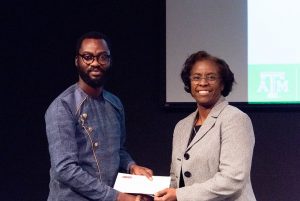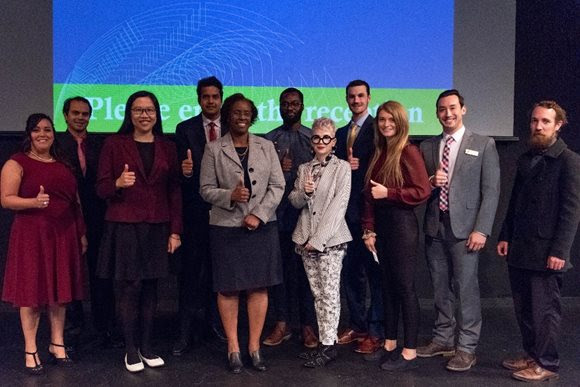The words of a winner
Edudzi David Sallah is the overall winner of this year’s 3 Minute Thesis (3MT) competition. Sallah’s story and research interests are nothing short of remarkable as he explores the worldviews of capital punishment.

By Hannah LeGare ‘19
Edudzi David Sallah isn’t your average student. He is not only a Ghanaian graduate student and teaching assistant with the Department of Performance Studies but also the overall winner of this year’s 3-Minute Thesis Competition.
The ability of researchers to explain their work concisely and clearly is an acquired skill that can affect the promotion of their work and the trajectory of their careers. Since 2013, G.R.A.D. Aggies, a professional development program of the Office of Graduate and Professional Studies (OGAPS), has helped graduate students at Texas A&M University gain critical communication skills through the international Three Minute Thesis (3MT) competition.
According to OGAPs, the 3MT is “a research communication competition developed by the University of Queensland. Graduate students have three minutes to present a compelling oration on their thesis and its significance.” 3MT is not an exercise in trivializing or “dumbing down” research, but rather challenges students to consolidate their ideas and research discoveries to present concisely to a non-specialist audience.
Sallah’s 3MT covered Ferdinand Kwasi Fiawoo’s stage play Toko Atolia, a prolific piece of Ghanaian literature. Sallah’s thesis explored the worldview that influenced the Ghanaian pre-19th-century practice of burying criminals alive.
Sallah’s journey into the world of performance studies — from Ghana to the U.S. — underscores the significance of his ultimate win at the 3MT competition.
“Break a leg!”
Sallah is an Anlo-Ewe indigene from southeastern Ghana. He studied theatre arts at the Department of Theatre Arts, University of Education, Winneba, for his Bachelor’s Degree, opting for acting as a major elective in his final year and acting in various Ghanaian stage plays.
As Sallah became immersed in theatre arts, he found something fascinating in the plays he performed in.
“Ghana is supposed to be a multicultural state, but all the Ghanaian plays I have read and acted in seemed to project one particular majority Ghanaian culture,” said Sallah. “I had to ask myself, ‘Is there a place for my culture in Ghanaian literature?’”
This lack of representation, combined with his experience in plays, influenced his desire to grow in the performance studies sector.
“I saw it as an opportunity to understand the various characters I represented on stage and how these characters are featured in a larger discourse in the academic world,” Sallah said. “I didn’t even look at other universities. I was glued to this one and submitted my application.”
In Texas A&M University’s Department of Performance Studies, Sallah gained valuable mentors that challenged him to think deeply about his academic practice. These factors propelled Sallah’s dedication to study the rich and little-explored indigenous expressive cultures of Ghana, particularly the Anlo-Ewe culture.
He soon realized if he wanted to reach larger audiences in performance studies, he needed to expand his research interests and scope. His focus began to cover transnational literature, and specifically African diaspora, culture, and literature. Sallah knew he needed professional development to grow himself as a researcher— therefore he entered the 3MT competition.
“Why should we care?”
An important goal of the Texas A&M 3MT is to strengthen graduate students’ research communication skills. In the competition, there are several working sessions to give students opportunities to learn about effective communication.
A preliminary competition determined who would advance as finalists in the Texas A&M 3MT. To further boost student development, judges in the preliminary round provided immediate feedback to students regarding their presentation and communication skills.
During this round, a guest judge asked Sallah a simple question: “Why should we care?” This question changed the trajectory of his thesis.
Sallah’s 3MT covered the stage play Toko Atolia and explored the worldview that influenced the defunct ancestral Anlo-Ewe (Ghanaian) practice of burying criminals alive. This mode of capital punishment is a focus of Fiawoo’s play.
Sallah’s thesis covered a hot topic in today’s world: capital punishment. He looked at the practice of Toko Atolia, or burying criminals alive, as highly relevant to American audiences. According to Sallah, some people have a problem with this practice and say it is barbaric.
Sallah said this misjudgment of Toko Atolia usually comes from outsiders. Instead, he flipped the argument and asked people to think about their culture’s practice of capital punishment, like lethal injection.
“We need to offer an appreciation of the worldview that shaped this practice even if it is barbaric,” said Sallah. “There are American norms, values, and beliefs on which lethal injection is counted. If we can find justification for lethal injection, we can find the judicial justification from the ancient folks of Africa who supported burying people alive.”
This was his response for why people should care about his research. He said people should examine their culture’s worldview that influences judicial practices, including capital punishment. Out of this project, he sought to understand the relationship between capital punishment, as a kind of performance or expressive form, and a society’s values.
And this was the response that led him to victory in the competition.
Beyond 3MT
Sallah was not only the Master’s Division winner, but also the winner of the overall 3MT competition.
“This honor is fulfilling and allows me to think about my future career interests,” Sallah said.
Going forward, Sallah’s larger career interests look at how indigenous African cultures resurface in African American cultures and literature. Through research of comparing literature and cultures, he wants to examine worldviews, like the one that guided Toko Atolia, and how they are adopted into African American social structures.
These critical studies can be found in the College of Liberal Arts. According to Sallah, the College of Liberal Arts houses the disciplines and resources for him to be successful.
“The liberal arts professors are supportive of your professional and personal goals,” said Sallah. “They have helped me to imagine the future.”
He is particularly grateful for the support of the faculty and staff of his department, especially Donnalee Dox and David Donkor, who are his thesis supervisor and the director of graduate studies, respectively. “I cannot forget to thank the amazing Sarah Franke, at the Office of the Dean, for her constant support.”
Sallah is thankful for the 3MT experience, as he learned how to detail his research to scholarly and non-scholarly audiences. He will represent Texas A&M University at the Regional 3 Minute Thesis Competition in Birmingham, Alabama, March 5th-7th, 2020. We wish him the best of luck and to “break a leg!”
Read more about the 3MT competition here.


